How Much Does an Inground Swimming Pool Cost in N.C.?
Are you considering installing an inground swimming pool in your North Carolina home and want to know how much it will cost? Here is everything you need to know about how much an inground swimming pool costs in N.C.
During the warmer months, backyard swimming pools can turn your boring backyard into an oasis. There are over 6,100,000 residential in-ground pools in the U.S., according to Pool & Hot Tub Alliance. As 2024 begins, you will need to know how much an inground swimming pool will cost you from start to finish.
Why not put a pool in the backyard instead of visiting a public swimming pool? Installing an inground swimming pool can be more complex than you might think, and similar to buying a home, there are many hidden costs. However, after 8 to 12 weeks, you can enjoy your new pool peacefully.
The overall cost of an inground swimming pool will vary greatly depending on the companies you use, the size of the pool, materials, and much more. Typically, fall or winter is the ideal time to install a pool, but don't worry; you still have plenty of time until summer to create the pool of your dreams.
Ensure you contact professionals to help you along this process. It is not something you can DIY. Nevertheless, you need to know exactly how much to save in order to build the perfect inground swimming pool in your N.C. home.
Keep reading to learn all about how much an inground swimming pool costs in N.C.
How Much Does a Vinyl Pool Cost?
Vinyl liner pools are typically the most affordable and easiest to install. If you need to save some extra cash, a vinyl liner pool is the only one you could DIY without extensive experience.
A vinyl liner pool will cost you anywhere between $25,000 and $40,000 to build. However, it may cost more or less, depending on the size of your pool. The overall cost will increase if you increase the pool size, liner, steps, and various other materials. The entire process will take between 6 and 12 weeks.
For those who decide to install a vinyl liner pool on their own, this will save you about $5,000; however, it is recommended that you always talk to a professional first. If you want to save money but don't have enough experience, you could consider completing part of the process, like the excavation.
One of the cons of a vinyl liner pool is that the liner will need to be replaced every 5-8 years. Replacing the liner will cost approximately $5,000 to $7,000 every time, and again, this can fluctuate depending on the size and how much you can do on your own. This type of pool is very affordable but is not as durable as the various other pool types.
This type of pool has a couple of pros and cons, including the fact that it may not add a lot of value to your home. In addition, they are not pet-friendly because your pets can tear the liner. It is important to keep this in mind if you plan on renting your home out.
Vinyl pools are great if you aren't sure what color or pattern you want because there are hundreds of options to pick from. Opting for a custom shape will cost you a bit extra, depending on the company.
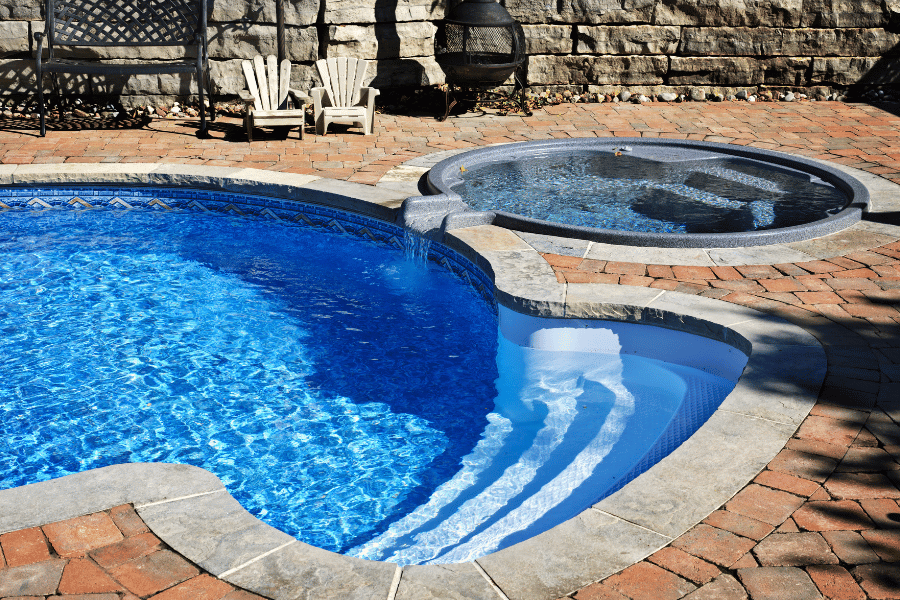
How Much Does a Concrete Pool Cost?
Concrete pools are trendy as they are easy to maintain and were the first ones used when residential pools became popular. Installation will cost you somewhere between $50,000 and $100,000. Again, the cost may increase depending on your pool's size, depth, and design.
Many homeowners install a plaster finish and build during the winter to save on installation costs. A well-maintained concrete pool will last over 50 years, much longer than a vinyl pool. However, you may need to replace the pool liner every 10 to 15 years.
Maintenance over this 50-year lifespan will cost upwards of $80,000. This will include acid washing, which costs $450 every 3-5 years, and resurfacing, which will cost about $10,000. You will need to keep up with paying for the chemicals, electricity, and water.
As the most customizable pool, concrete pools will vary the most in price, all depending on the size and other factors. You will need to choose between the main surface options: plaster, aggregate, or tile. Aggregate and tile are the most expensive and popular.
Concrete pools are the most likely to grow algae, so routine pool cleaning is essential for this pool type. On average, you can be swimming in your new concrete pool within 3-6 months.
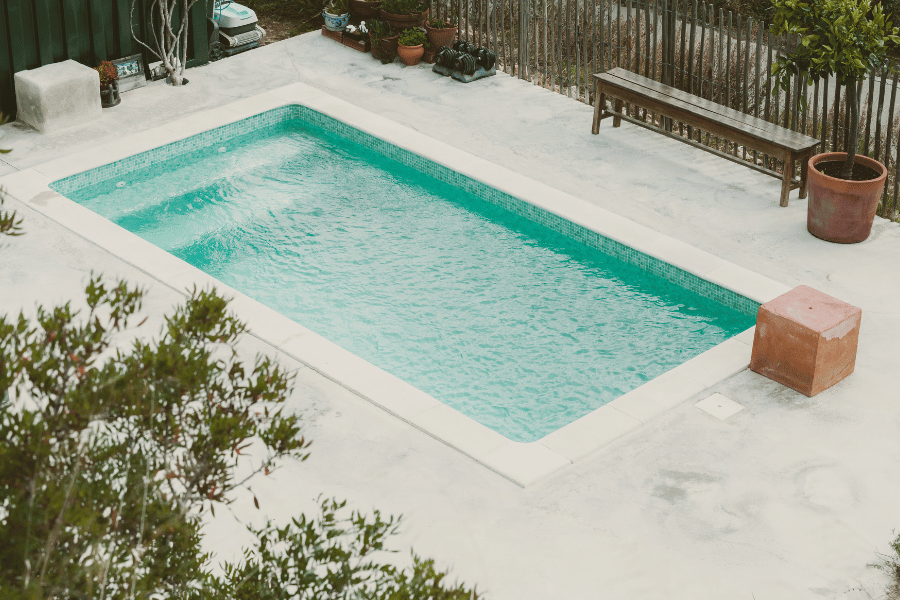
How Much Does a Fiberglass Pool Cost?
A fiberglass pool is the hardest to create on your own; luckily, it requires the least amount of maintenance and lasts the longest. A fiberglass pool structure and surface are highly durable. This type of pool in N.C. will cost about $40,000 to $85,000, depending on the size and company you use for installation.
Fiberglass pool maintenance will primarily focus on water, chemicals, and electricity. On average, these expenses will cost about $4,000 over ten years. A fiberglass pool is easier to maintain because you won't need to frequently replace the liner, replaster, or acid wash the pool.
The gel coat surface should last the pool's entire lifespan, but you can resurface the pool if you want to. A fiberglass pool should last 50 years or more and increase the resale value of your home. This means that even though they are the most expensive, you might be able to get the biggest bang for your buck in the long run.
A fiberglass pool will require the least amount of labor to maintain, especially because they are algae-resistant. This pool type will only take about 2-4 weeks to install, making you one step closer to getting to enjoy all the beautiful summer days in N.C.
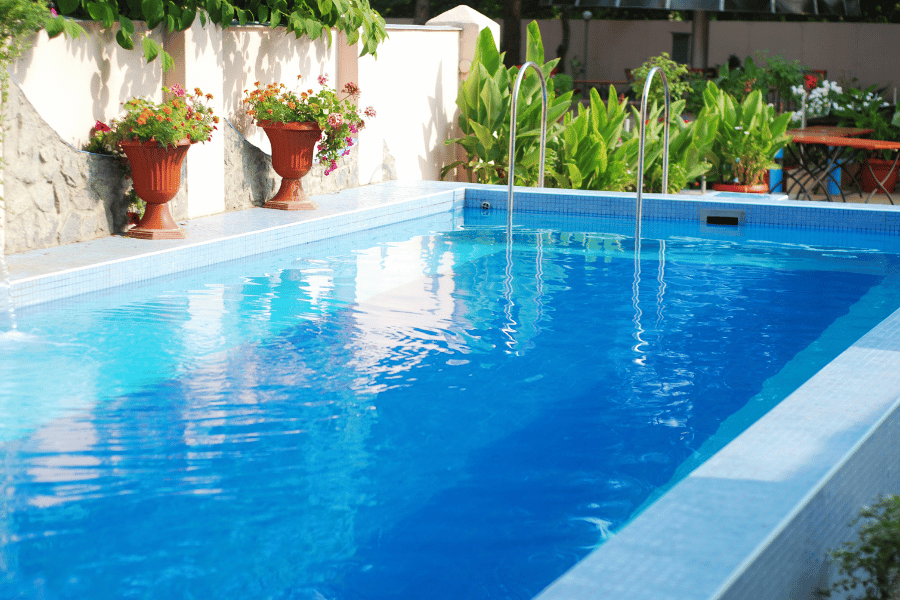
Breakdown Of The Basic Pool Costs
When evaluating how installing an inground pool will impact your home's value, ensure you consider all the costs. This will include maintenance, installation, and any additions you may want to add.
The biggest expense of having any pool is the maintenance. This will include fees, new filters, resurfacing, upgrades, removal, and more. Here is a deeper look at the typical maintenance of an inground pool, according to the National Association of Realtors and Forbes.
| Maintenance Type | Average Cost |
| New Filter or Pump | $500 |
| Resurfacing a Pool | $5,000 - $10,000 |
| Installation Fees | $25,000 - $50,000 |
| Pool Cleanings | $50 per month |
| Repair Pool Drain | $400 - $700 |
Keep in mind that all of these costs will vary greatly depending on if you complete the maintenance on your own or hire a professional. For example, repairing or replacing a pump motor on your own can cost between $150 and $1,000. According to Forbes, hiring a professional will cost you between $1,500 and $2,000.
On average, monthly pool maintenance will cost about $180. Keep in mind that these averages will vary greatly depending on the size, type, materials, and capabilities. A large part of maintenance will be battling algae on the pool walls, and this only costs you about $60 to $90. Cleaning is essential as a pool owner but will cost you time and money.
You will need to buy a pool cover and possibly a safety cover; this costs between $8,00 and $20,000 altogether. A pool cover is the most effective means of reducing pool heating costs, and a good quality cover should last about 5 to 10 years.
Overall, you should budget at least $25,000 to construct any pool. You can even apply for a pool loan to help you with the costs.
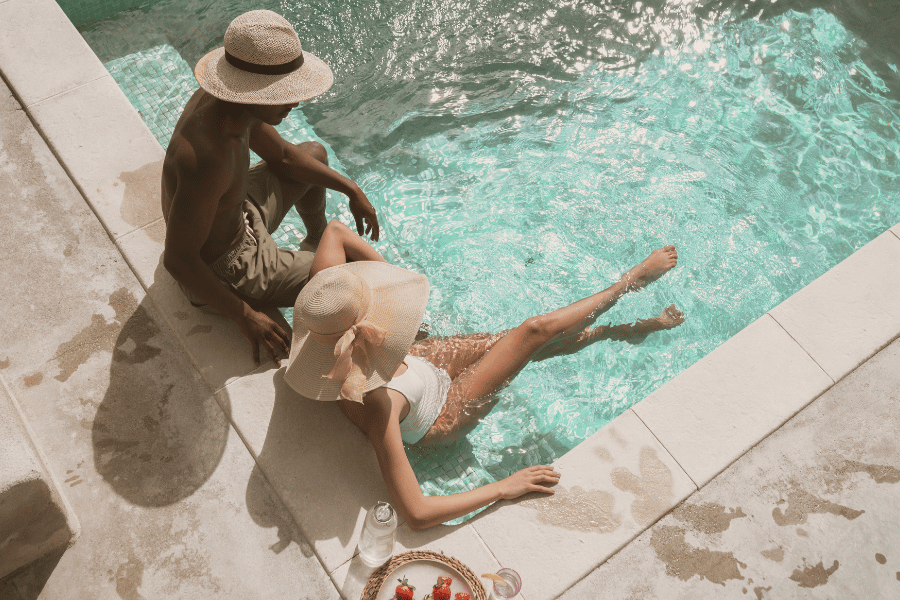
Inground Pool Tips and Tricks To Save Money
Here are many ways in which to save some extra cash if you decide to install an inground swimming pool in N.C.
Storing Your Vacuum Correctly
Many pool owners make the mistake of storing their vacuum heads incorrectly. This can lead to the brushes on the bottom falling off or flattening. Make sure to store your vacuum head out of the sun and upside down. You can even double the life of your vacuum head by keeping it away from the chlorine.
Prepare Your Pool for The Winter
In order to save money during the pool off-season, follow these simple tips.
- Drain the pool 6 to 8 inches below the skimmer
- Remove the pool filter and pump hoses
- Store the pool filter and pump out of the sun
- Invest in a winter plug in the return line
- Buy closing chemicals
Build a Pool Cleaning Schedule
Building a pool cleaning schedule may not save you the most amount of money, but it will save you stress. It can be hard to keep up with maintenance, but it's essential. Consider buying a robotic pool cleaner to scrub the surface and collect debris.
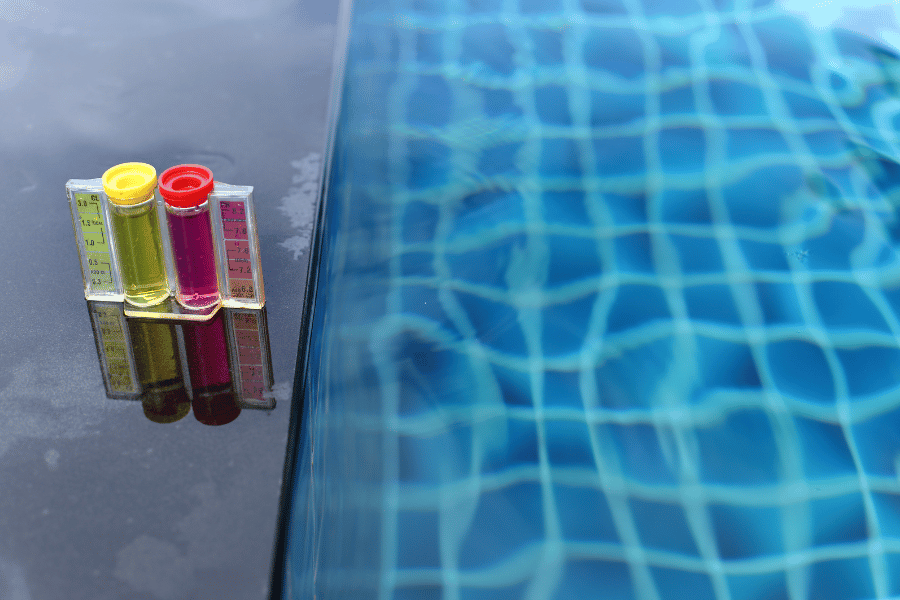
Methodology
We used information and data from several different sources, as well as our own data, to determine how much an inground swimming pool costs in N.C. Most of the data was sourced from the following sources:
FAQ: How Much Does an Inground Swimming Pool Cost in N.C.?
Here are some commonly asked questions about the price of an inground swimming pool in N.C.
Is a pool worth it in North Carolina?
Not only is the weather perfect for a pool in North Carolina, but it can increase your home's value significantly. Some pool materials will add more value than others; for example, a fiberglass pool will increase your home value more than a vinyl-liner pool.
What is the cheapest inground pool to build?
A vinyl pool will typically have the lowest initial costs. This is still a great pool type to have, and you can customize it into different shapes, designs, and colors.
Do you need a permit to build a pool in North Carolina?
Installing a swimming pool will require a building and electrical permit. You may also need a plumbing permit if the water service extension is connected to the home water supply. If you are a part of an HOA, you may need to contact them and make sure you can install a pool in your yard.
What is the future of the pool industry?
The Global Swimming Pool market is projected to grow exponentially in the coming years. Since 2022, the pool market has grown steadily, but it is anticipated to rise even more between 2023 and 2030.
What are the new technologies for pools?
There have been several recent advancements in pool technologies. One of the most anticipated advancements is efficient pool pumps. These would use less energy and help reduce pool operating costs.
Cost of an Inground Swimming Pool in N.C. - The Bottom Line
Any home improvement process will bring much excitement and some stress, but it will always be worth it in the end. Just wait till you can enjoy all of the amazing North Carolina summer nights by your brand-new pool.
Before building your pool, make sure you are aware of the costs and save up accordingly. You need to ensure you are in the right state financially to build the pool.
When it comes time to sell, your pool will add to your home's value, and you could possibly get your money back. Keep in mind that pool maintenance will contribute to the overall cost, so make sure you have extra cash to contribute towards year-round maintenance.
As you are searching for your next home, Raleigh, NC, is one of the fastest-growing areas in the country and has many beautiful homes for sale, with plenty of room in the yard for an inground pool; you'll have to act fast if you want to buy your dream home in one of Raleigh's best neighborhoods.
Before you buy your next home in the Triangle, feel free to contact one of our helpful real estate specialists, as they are eager to help you find the perfect home. We know that buying a home can be overwhelming, so make sure you are prepared beforehand.
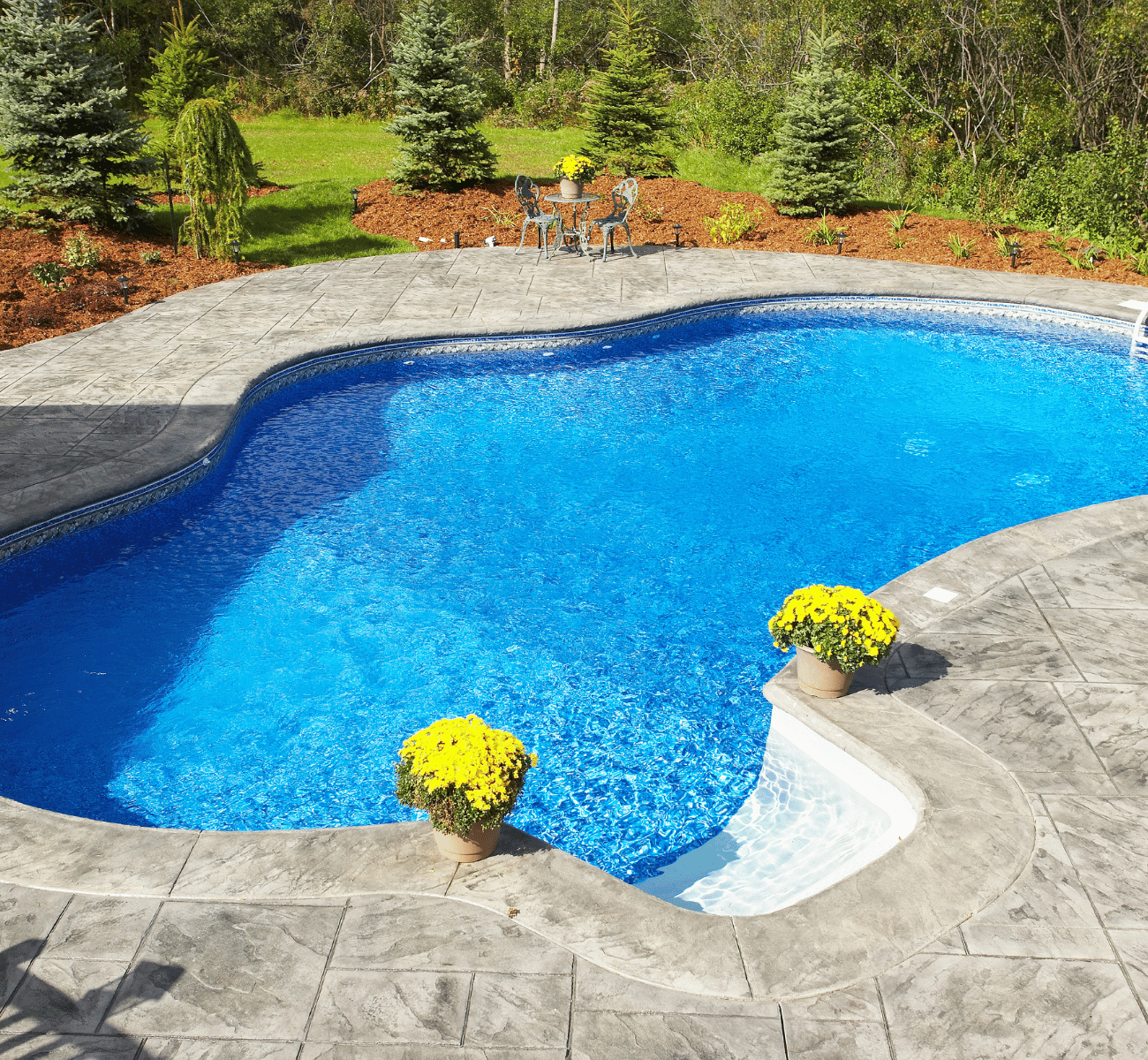

![Top 7 Gardening Statistics and Trends [2025]](https://raleighrealty.com/rr-images/uploads/blogs/1755306504952-676028264-Gardening-Statistics.png)
![Top 7 Pool Statistics and Trends [2024]](https://images.agentloft.com/rr-images/uploads/rr-migrated/blogs/February2024/ZWKKRRW5bSFPsdwrpo91.png)